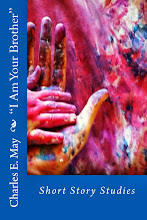One
of O'Connor's best-known books is his study of the short-story genre, The
Lonely Voice, in which he argues that, as opposed to the novel, the short
story takes as its primary subject the experiences of what he calls a
"submerged population group," such as the peasants of Turgenev and
Chekhov and the small-town folk of Sherwood Anderson and James Joyce. For O'Connor, the short story does not deal
with human experience within the context of a fully-organized social world, but
rather within the broader and more universal context of Pascal's "The eternal
silence of those infinite spaces terrifies me."
Although
most critics agree that O'Connor never perfected the short story to the degree
that his countryman James Joyce did, on the other hand, his profound
understanding of the secret of the short story's inherent difference from the
novel, as well as his ability to capture what he called "The Irish
middle-class Catholic way of life" in delightful little comic vignettes,
has assured him a permanent place in the history of 20th-century Irish
Literature.
Although
the speaker in this story is obviously older than the young boy in Joyce's
"Araby," the conflict of the two stories is basically the same--the
tension between a romanticized view of a young woman and a more realistic
view. However, the focus of the two
stories is different. Joyce leads the
boy to a realization about himself, whereas O'Connor leads his protagonist to a
realization about the girl.
The
tone of the two stories is also different.
Whereas the voice in Joyce's story is serious, the voice of O'Connor's
young man is comically self-deprecating.
The language of the first-person narrator in this story might be
compared with the language in Updike's "A&P" and Bambara's
"The Lesson," for the voice of the speakers carries all three of
these stories, and the issue in all three is how the language creates a tension
between sympathy and judgment in the reader.
However,
the title of O'Connor's story, as well as the final section when the
protagonist returns home, suggests that the central theme of the young man's
attitude toward Kitty has something to do with his mother. One's first reaction may be that the Judas of
the story is the boy himself, for he has betrayed his mother in some way. The conventional reference to the crowing of
the cocks after his sleepless night also suggests this. Yet, neither the action
nor the imagery of the story indicates that the protagonist is the Judas
betrayer.
The
real Judas in the story is the mother; for although the story is about the
young man's anguish of betraying his mother with another woman, it is even more
about why the boy is made to feel this way.
The problem is that the mother, by instilling in the son an image of her
own goodness and purity, betrays him into believing that all women except the
"bad women" he reads about in books, are like his image of his
mother. Thus, he feels guilty for the thoughts he has about "good
girl" Kitty Doherty, thinking that she is "pure indeed," while
he has a mind of a cesspit"; while she is "angelic," he is a
volcano of brutality and lust.
When
Jerry finally confronts Kitty and hears her talk in "cold blood about
'spooning' with fellows all over the house, the revelation is like:
"another door' opening on the outside world. And indeed lt is the outside world; it's the
real world of women, not the false world he has been betrayed into believing
because of the inevitable influence of the mother. He felt "like a man who'd lived all his
life in a dungeon getting into the sunlight for the first time. . . ."
Thus
resurrected from his guilt he goes home singing, "as if a stone had been
lifted from my heart." But the mother's image has not been completely
banished. He faces the silent reproach of her waiting in darkness, worrying
about him. His cruel retort to her
whimpering question is an expression of his anger at being betrayed now that he
feels that he is a stranger to her.
Jerry,
then, is not so much Judas as he is the ironic suffering Christ deceived by the
mother (who here takes on the image of the archetypal pure mother Mary) into
thinking that all women are pure. Of course, he is not released from this
identification yet, nor perhaps will he ever be. As he lies awake, every time
he thinks of Kitty's face waiting to kiss him, it is the mother's face that
comes up to him.
The
final image in the story completes the terms of the ironic Mary-Christ
parallel. When Jerry goes to the mother's room and sees her sitting in bed
under the Sacred Heart Lamp he bursts out crying and she spreads her arms to
hold him in the classic tableau of the Pieta'.
"All she could do was to try and comfort me for the way I'd hurt
her, to make up to me for the nature she'd given me."
Tomorrow:
Kate Chopin's "Desiree's Baby"





No comments:
Post a Comment